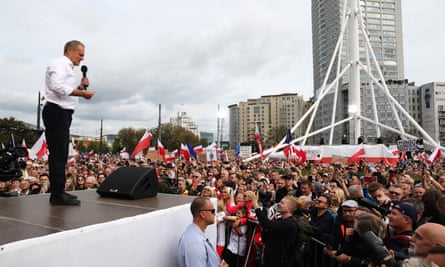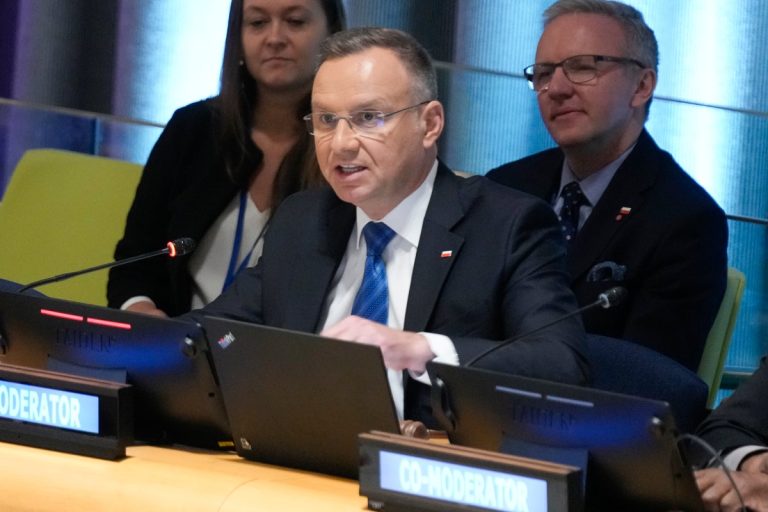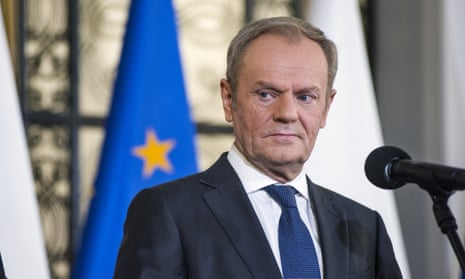Nobel laureate urges Polish opposition to commit to progressive causes | Olga Tokarczuk

The Polish opposition seeking to topple the country’s rightwing populist government needs to start spelling out its commitment to progressive causes, the Nobel laureate Olga Tokarczuk has urged in a rare political interview.
“We as citizens will need to be assured that a new government would have faith in democracy, Europeanism and freedom guaranteed by law,” Tokarczuk told the Guardian two weeks before Poland goes to the polls in a potentially pivotal election on 15 October.
“We need assurances that such a government would listen to us and respond to our needs, and not, like the present one, subordinate the majority of citizens to anachronistic ‘traditional values’ adhered to only by a 30% minority,” added the novelist, who was jointly awarded the Nobel prize in literature with Austrian author Peter Handke in 2018.
In what is shaping up to be a tightly fought election, the former president of the European Council and centre-right leader of the Civic Platform party, Donald Tusk, is the only realistic challenger to the governing Law and Justice party (PiS), chaired by the deputy premier, Jarosław Kaczyński.
The Civic Platform leader, Donald Tusk, during the ‘Million Hearts March’ in Warsaw, Poland on 1 October. Photograph: Anadolu Agency/Getty Images
Tusk has sought to reach out to voters beyond the liberal-leaning cities where he draws the majority of support, leading to criticism that he is feeding the right’s obsessions with issues such as immigration and abortion. The former prime minister, who would most likely need to enter alliances with parties to his right or left to regain power, has recently tried to assuage those fears, expressing his commitment to civil partnerships for same-sex couples and gender-recognition processes for trans people.
Tokarczuk, an avid supporter of women’s rights and attender of marches against Poland’s restrictive abortion laws, has long been criticised over her supposedly “anti-Polish” views by nationalists and conservatives.
“[If] I refer publicly to anything to do with current Polish social or ecological policies, journalists who depend on the present government will immediately respond by stigmatising my words, and the trolls will start up their hate,” she said. “It demonstrates that my beliefs are awkward for the present government, not just during an election campaign.”
But some campaigners for civic liberties say a campaign of intimidation against Polish intellectuals has proved effective, making prominent figures like Tokarczuk hesitant to explicitly comment on political affairs.
Asked if she would recommend voting for Tusk’s Civic Platform in the interview, which was carried out via email and translated by her longtime translator Antonia Lloyd-Jones, Tokarczuc declined to endorse a single party.
But the author of Drive Your Plow Over the Bones of the Dead said “the most important thing” for any future government was to steer against the current social trends in her country.
“If the government changes in Poland, then I hope – regardless of what kind of coalition emerges after the vote – that above all it will put a stop to the anti-progressive, anti-civic activities we have been dealing with in recent years, and which have been intensifying from one month to the next,” Tokarczuk said.
“We must put a stop to further degradation that is leading Poland towards authoritarianism; that’s the most important thing now.”
 The Polish prime minister, Mateusz Morawiecki, speaks at the Law and Justice party convention under the slogan ‘Safe Poland’. Photograph: Zbigniew Meissner/EPA
The Polish prime minister, Mateusz Morawiecki, speaks at the Law and Justice party convention under the slogan ‘Safe Poland’. Photograph: Zbigniew Meissner/EPA
While PiS has sustained the lead it has held over Tusk’s Civic Platform (PO) in polls since May 2015, its support is noticeably down from the last national vote in 2019. To assemble a working majority, it will probably have to win back seats from the far-right Confederation party, or enter a coalition with them.
Tokarczuk said she was not surprised that PiS had lost support even as the Polish economy had caught up on the west, overtaking Spain in the EU’s household wealth index this summer. “In Poland we have one of the highest inflation rates for the longest time in the European Union, a national debt that is beyond reasonable measure, and at the same time a failure to use the money donated by the EU for the national recovery plan,” the author said.
“Many other Poles are probably asking the same question as I am: where is this growth? If support for PiS is falling, it’s because we can see that Poland is wasting its resources, its economy is being badly managed and its diversity is being destroyed.”
The illiberal turn of central eastern European states, most notably Hungary and Poland, has often been explained as a rebellion against cosmopolitan and multicultural values championed by the west. But Tokarczuk said she also recognised a counter-current in her country, a yearning for cultural diversity in the region that was destroyed during the years of Nazi rule and the Soviet era.
“Homogeneity is not natural in this part of Europe, many people can feel there’s something missing,” said the author, whose latest novel, Empuzjon, was published in Polish in December 2022.
“I notice the areas where a nostalgia for diversity is being felt more and more, being cultivated and restored. I hope these phenomena will put up resistance in the near future to idealized, fictional homogeneity, a concept that, put into effect for nationalist ideas and duly made to serve the demagogues, has already done so much harm in the history of the world.”
As the former states of the Soviet bloc tried to forge national identities out of the ruins of an empire, neighbours Poland and Ukraine were often fiercely, sometimes violently, at odds. But Tokarczuk said she was not surprised by the solidarity her compatriots had displayed since the start of Russia’s invasion last February.
“In the face of injustice towards others the Poles are capable of very noble behaviour,” she said. “May that last as long as possible. May they not yield to attempts at manipulation on the part of nationalists.” She cited ordinary people helping refugees on the Polish-Belarusian border as another sign of a compassion that defies contemporary portraits of her country.
She backed the Polish director Agnieszka Holland’s film about the Polish-Belarusian migration standoff, The Green Border, saying attacks on the film by the Polish officials had prompted her to feel “horror and disgust”.
“In the context of the major problems demanding swift solutions with which the world and Poland are struggling, it is shocking that politicians find the time to make malevolent, mean-spirited comments about movies that they haven’t even seen.”
“It is clear that the role of these comments is merely to reinforce the divisions within society and to radicalise public feelings in the run-up to the election”, she added. “Only a government that is playing for all and that does not shy away from violence is capable of treating an artist like an object in such a ruthless way.”




